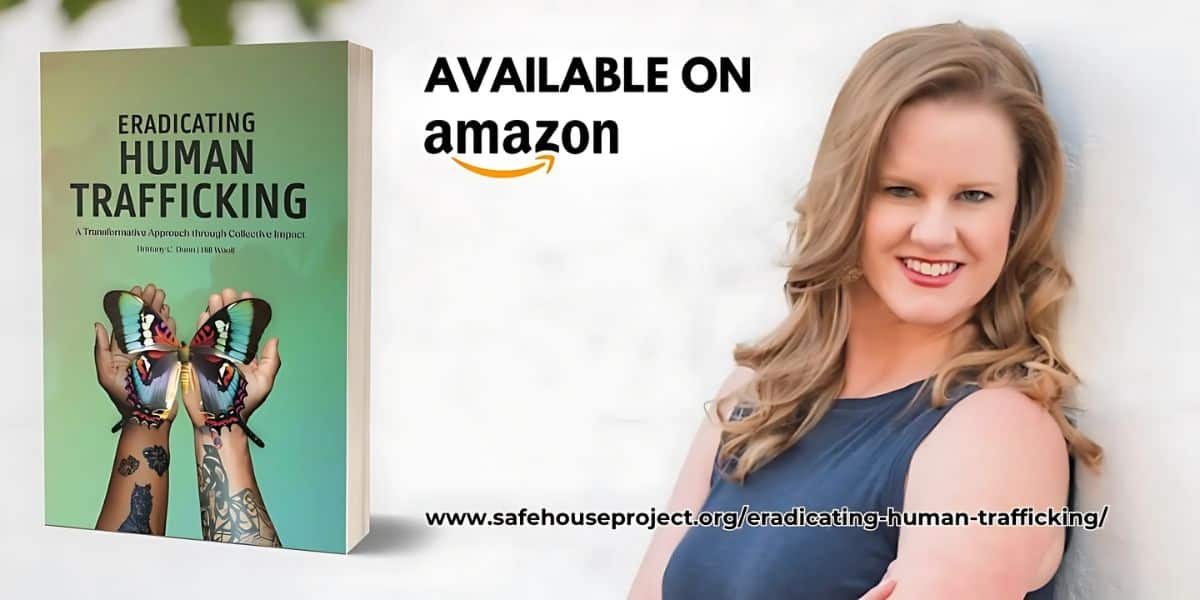Brittany Dunn’s journey into co-authoring Eradicating Human Trafficking: A Transformative Approach Through Collective Impact was sparked by a bold challenge posed by Charlie Fote, a respected business leader and philanthropist. Fote’s assertion, “I don’t want to know how to respond to the issue of child sex trafficking. I want you to tell me how we end it,” prompted Dunn to think beyond traditional reactive measures. Collaborating with Bill Woolf, a veteran in anti-trafficking initiatives, Dunn developed a holistic framework rooted in collective impact. The result is a comprehensive guide that aims to shift the conversation from mitigation to eradication, addressing systemic issues, dismantling criminal networks, and providing survivors with critical support.
At the heart of their work are the voices of survivors, whose testimonies profoundly shape the book’s message and approach. Dunn emphasizes that survivors’ lived experiences are not merely illustrative but are integral to crafting effective solutions. Their insights shed light on critical gaps in current systems, expose unintended barriers, and suggest potential interventions. Survivors’ perspectives on the tactics of traffickers, their exploited vulnerabilities, and their recovery journeys offer valuable guidance on what works and what doesn’t in combating trafficking. This survivor-centered approach is pivotal, ensuring that solutions are designed with input from those who have firsthand experience and are implemented with their ongoing guidance and leadership.
One innovative aspect of the book is its emphasis on actionable tools and strategies, particularly the integration of advanced technology for identification and reporting. Dunn envisions a user-friendly platform accessible to professionals across various sectors, enabling timely documentation and reporting of potential trafficking cases. A centralized data repository further enhances this system, aggregating information from diverse sources—healthcare providers, transportation staff, and law enforcement—to identify patterns, monitor trends, and allocate resources more effectively. By transforming isolated data points into actionable intelligence, this approach supports a proactive stance against trafficking, focusing on prevention and coordinated responses.
Dunn’s involvement with the Safe House Project has provided her with deep insights into the multifaceted challenges survivors face. Many grapple with severe mental health issues, including trauma bonding and a lack of trust in support systems. Access to trauma-informed care often involves long waitlists or providers who may not be fully equipped to address trafficking’s unique dynamics. Employment barriers, skepticism from others, and retraumatization further complicate recovery. However, when survivors receive comprehensive, trauma-informed care—including stable housing, mental health services, economic opportunities, and community support—they have a better chance of thriving. Dunn’s experiences reaffirm her belief in holistic, survivor-centered approaches that address both immediate needs and long-term stability.
Dunn’s diverse career—spanning economics, global management, and social justice—uniquely equips her for anti-trafficking advocacy. Her background in economics provides insight into the market forces driving exploitation, while her experience in global management aids in coordinating large-scale initiatives and navigating complex systems. Her work in technology development directly informs her strategies for leveraging data and technology to combat trafficking. Combining these skills with survivor-informed approaches, Dunn has played a role in creating scalable, sustainable solutions that aim to address systemic issues and empower survivors.
One particularly moving story from her work underscores the potential impact of trauma-informed care. A survivor shared her experiences at a partner safe house, describing transformative “firsts”: bottle-feeding baby goats, witnessing the Northern Lights, and, most importantly, feeling safe and loved. These moments highlight the importance of providing an environment that supports healing and growth. The survivor’s candid acknowledgment of the challenges of accepting care after trauma underscores the need for consistent, compassionate support tailored to each individual’s journey.
For those new to the issue of human trafficking, Dunn recommends starting with evidence-based education to dispel myths and provide accurate information. Completing OnWatch training at IAmOnWatch.org is an impactful first step, equipping individuals to recognize and respond to trafficking signs. Dunn also advocates for utilizing tools like the SafeWatch system, which enables real-time reporting of suspicious activities, thus strengthening community responses and bridging the gap between awareness and action.
Beyond education, meaningful contributions include:
- Active Observation: Apply training in daily interactions, using platforms like SafeWatch to report potential trafficking situations responsibly.
- Supporting Service Providers: Volunteer, donate, or offer professional expertise to organizations delivering direct services to survivors.
- Engaging in Prevention: Advocate for anti-trafficking legislation, support youth education programs, and collaborate with businesses to implement prevention policies.
- Long-Term Commitment: Consistent involvement—whether through advocacy, education, or direct support—is vital for sustained impact.
Dunn underscores the importance of aligning contributions with personal skills and resources, leveraging technologies like SafeWatch to enhance collective efforts. By fostering a vigilant, informed society, individuals and communities can actively disrupt trafficking networks and support survivors on their path to freedom.
Through her work and advocacy, Brittany Dunn exemplifies the power of combining expertise with survivor-centered approaches. Her book, co-authored with Bill Woolf, offers a transformative roadmap for eradicating human trafficking, emphasizing collective impact, innovative tools, and the invaluable wisdom of survivors. By challenging conventional responses and advocating for systemic change, Dunn inspires hope for progress toward a future free from the scourge of trafficking.
Find your copy of Eradicating Human Trafficking on Amazon.
Learn More About Safe House Project Today!
Disclaimer: The content of this article is intended for informational purposes only. It reflects the views of the author and should not be construed as professional advice. For specific legal, medical, or psychological guidance, please consult with a qualified professional.
Published by Iris S.









